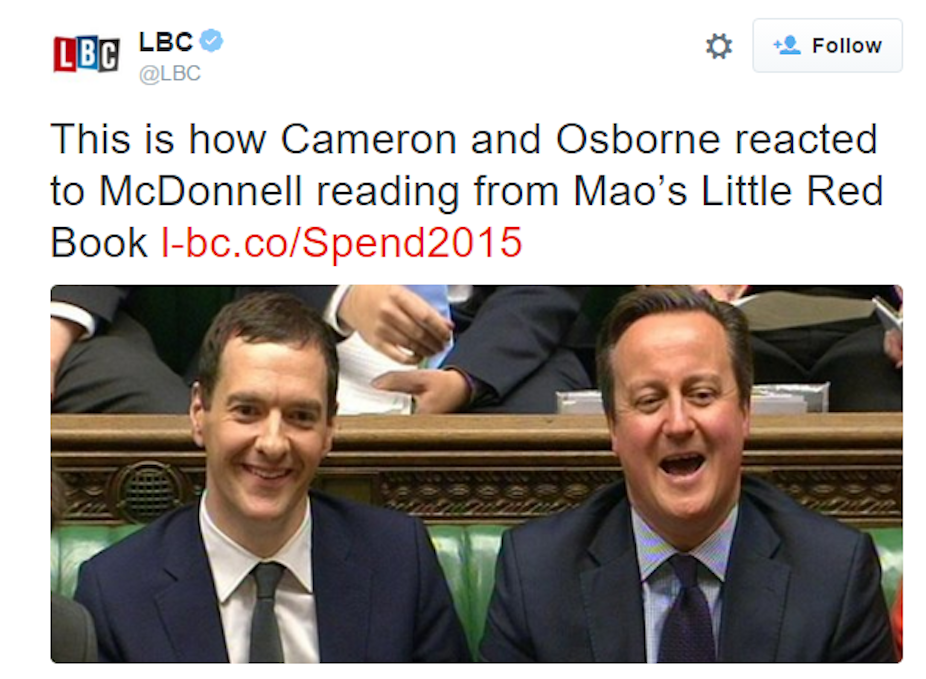It was always going to be a car-crash moment for Labour. When, during his reply to to George Osborne’s autumn statement, the shadow chancellor, John McDonnell, chose to flourish Chairman Mao’s little red book, he was simply playing into the hands of a hostile media that sits in wait for moments such as this. Far from focusing on the chancellor of the exchequer’s U-turn over tax credits, political journalists obsessed over this gaffe, while the Treasury benches erupted in delighted mirth.
This highlights one of the most pressing problems for Jeremy Corbyn and the Labour leadership. A seeming inability to manage their relationship with the media.
One of the most important objectives for the opposition party is to be able to prove to the electorate that they are a convincing party of government. To do so they need to display competence of internal party management and an ability to criticise the government of the day without appearing opportunistic as well as a clear policy platform upon which to convince the electorate they have a coherent set of policies. Put simply, an opposition needs to look, act and be like a credible government in waiting.
Part of the way to do this is to have a cooperative relationship with the media which enables them to communicate their messages to the electorate in a professional manner. For example, New Labour’s media strategy during the opposition years was to curtail the impact of their critics by courting the affection of News International. Whilst this was deeply troubling for some within the party, it was identified as a necessity because of the audience size which The Sun, among others, had.
Furthermore, if New Labour was able to gain one of Labour’s most fierce critics, then it would send a message to the electorate that it was truly a modernised party. Put simply, if Labour was to speak to the readership of that outlet, it needed to have a clear communications channel.
Few friends in the press
Now, however, the Labour Party under Corbyn has adopted a far more combative relationship with the media. Indeed, shortly after being elected, Corbyn refused to speak on Sky News, enabling the broadcaster to show several minutes of him walking in silence. This sends the implicit message that Corbyn does not want to address the viewers/voters.
This strategy is, no doubt, met with high praise by his supporters. However, supporters are not those that Corbyn (or the Labour Party at large) needs to convince. Rather, it is the centrist voter.
Granted, opponents of this view highlight the support Corbyn attracted during the leadership election. It is undeniable that 250,000 votes is impressive for a party leadership election, but it needs to be contextualised against the millions who comprise the electorate. Those millions need to be convinced – and at present Corbyn and the leadership are simply ignoring them.
More generally, the media, both broadcast and print, remain important avenues in our political discourse. Needless to say supporters point to the new media and the amount of grassroots support exhibited on Twitter and Facebook, etc. But even here, caution is needed – because the percentage of the electorate who engage in Twitter debates is very small.
Out of control
So, what is to be done? Put simply, the Labour leaders’ treatment of the media is highly problematic. By disconnecting themselves from the media, they are disconnecting themselves from the electorate.
Supporters of this position would point towards media bias against Labour – but, given the performance of Corbyn, McDonnell and others since assuming control of the party, it is unsurprising that coverage has been less than congratulatory.
For example, the emergence of Momentum, a body both inside and outside the party, has been presented as a threat to the parliamentary party. Meanwhile, the Labour leadership’s seeming inability to manage the legitimate concerns of its MPs has led to heated exchanges during meetings – exchanges which would gave grown even more strident over Corbyn’s unconvincing response to the terror attacks in Paris and his stance on Trident. In isolation these can be explained and/or even justified, however when taken in concert with each other, it gives the impression of ineffective leadership and a party out of control.
Tony Blair once famously said to John Major at prime minister’s question time: “I lead my party, he follows his”. This was an attempt by Blair to show that Major was unfit to be prime minister or, indeed, Conservative Party leader.
Today, Corbyn follows elements within his party by choice. His leadership is defined by its representative role. But it is not representative of the people, nor is it representative of the PLP. Rather he is the representative of a left-wing faction against which the electorate has traditionally voted. By eschewing the media, Corbyn is depriving himself of the opportunity to challenge this interpretation to those who, ultimately, will decide if he becomes prime minister.
It isn’t the PLP, Momentum, the constituency parties, the TUC, or even the Corbynites who will decide. It is the mainstream electorate, who in May chose to return a Conservative Party to government after five years in coalition with the Lib Dems. If Corbyn and the Labour leadership want to convince the electorate to vote for a Labour government in 2020, they need to connect with the media; they need to show a competent image and to explain to the electorate why the Conservatives need to be removed from power.
Otherwise, these will be five wasted years, which will make victory in 2020 impossible, and very hard in 2025.

